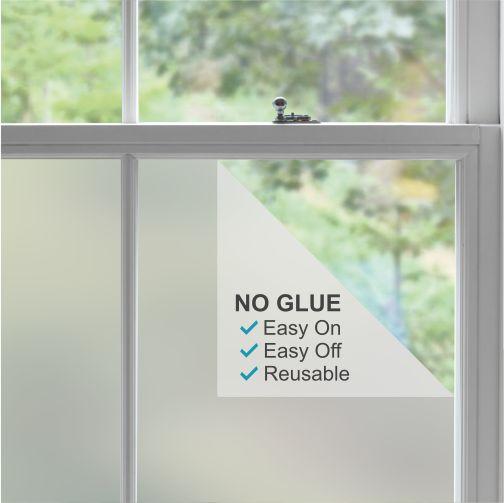Frosted Static Cling Window Film
Our static cling frosted window film is a non adhesive vinyl material which is applied directly to glass, for privacy day and night, to hide an unsightly view, or to keep your valuables from prying eyes. As it is non adhesive, it is very easy to apply and remove, making it ideal for rented properties or for temporary privacy requirements. However, the film is very durable and will last for many years if required. Available in 1.5m width in a length of your choice, or cut to size to your exact measurements.
Read MoreMeasurement Convertor
Product Description
Frosted Static Cling Window Film
- No glue, no mess
- Apply in minutes, remove in seconds
- Ideal for 24h privacy
- Hide valuables or an unsightly view
- Prevent your dog from barking!
- Long term or short term use
- Suitable for bathrooms & kitchens
- Free application tool
Our static cling frosted window film is a non adhesive vinyl material which is applied directly to glass to enhance privacy, to add security, or as an affordable alternative to net curtains. Once applied, the film will give you 24 hour privacy from either side of the glass, with very little loss of natural light. Unlike self adhesive frosted window film, static cling film has no glue but instead relies on a static charge to cling to glass. The main benefit is that the film is easy to apply, and even easier to remove. This type of product is therefore widely used in rented properties like flats and offices, or on building sites. The other benefit of the static privacy window film is that it also hides valuable items from sight for added safety, and can mask an unsightly view just as well.
Static cling frosted window film can be applied to any smooth non textured glass surface, including double glazed units, and can be used anywhere in a home or office, including on a bathroom window as it is resistant to condensation. It can be used on the bottom half of a bay window for example, or to cover a whole glass door. It is ideal for rented properties or short term office lettings. Frosted privacy film can also be used on a building site to cover large windows and hide tools and equipment, or on your front door to hide post whilst on holidays.
Unlike the self adhesive version, static cling film has a clear protective liner which when removed activates the static effect whilst protecting the cling side. Because there is no metric grid printed on the back of the static cling frost, we would recommend ordering this product cut to size, especially if you have a large amount of panes to cover.
The static frosted film gives your windows and doors an opaque finish similar to acid etched glass. The frosted glass effect is emphasised by a slight graininess of the film, which makes it more realistic. It is neutral in colour but will give clear glass a grey white translucent colouring. If you're not sure whether this is the right product for you, feel free to ask for a free sample first.
We have also been told by dog owners that privacy frosted film can help prevent your dog from barking at passers by walking past your window, or at squirrels on your garden. Just apply a strip of frost film up to the height of your dog when standing on it's hind legs. You'll be amazed at the results.
Buy online with confidence from Purlfrost
Our website is packed with practical privacy frosted window film products available for delivery in the United Kingdom from our London office building. Our customer service and experience is second to none and we are the highest rated window film company on Truspilot with over 8000 reviews from satisfied customers. We hold plenty of stock of a wide range of window films and tend to ship your items within 24h of your purchase for prompt delivery using either Royal Mail or TNT for shipping throughout the country. Free shipping is available for orders over £50.00.
Back to top
How To Apply
Step by step instructions on how to apply window film & frost glass
Regardless of the type of window film or stickers you purchase, whether frosted, tinted, mirror or decorative, the principle on how to fit window film will be the same. We also have several targeted video tutorials which you will find by clicking here.
Glass Preparation (the crucial task)
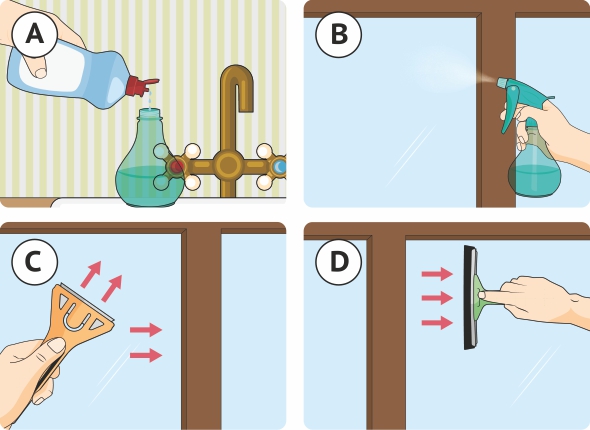
Make a slip solution using a few drops of washing up liquid mixed with water in a spray bottle and thoroughly clean the glass. Use a glass scraper to remove specks of paint, or any other glass covering like stickers.
Film Cutting
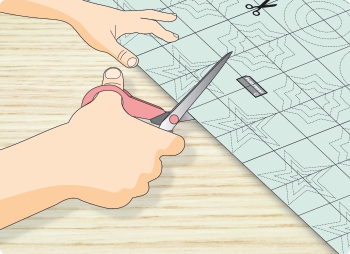
Unless your window film is already cut to size, and if the film has a paper liner with a metric grid, measure your glass at the top and bottom, and left and right and mark and cut your window film. You can also cut the film bigger than required and trim it once applied to the glass.
Film Application
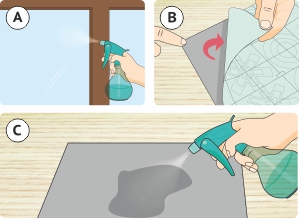
A. Thoroughly wet the glass with the slip solution.
B. Place the window film face down an a flat surface and expose a small amount of the adhesive or cling side.
C. Spray the adhesive or cling side liberally with the slip solution as you peel off the protective liner.
D. Slip the adhesive or cling side of the film on the glass butting one edge and the top against the window frame or rubber gasket (double glazed unit).
Squeegee Technique
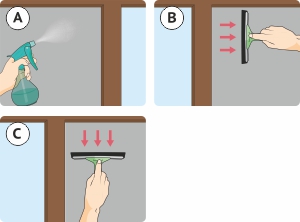
A. Liberally wet the face of the film with the solution to act as a lubricant fro your squeegee or felt edged tool.
B-C. Squeeze out the solution from under the film using a firm and even pressure, starting from the top and working your way down and across the film.
Film Trimming
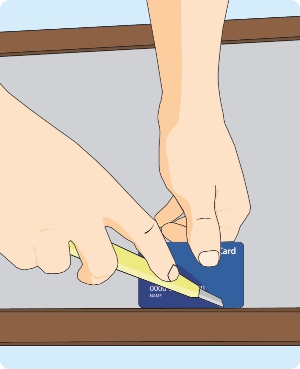
Run a credit card and a retractable knife blade down the edge of the glass to trim any excess film. The thickness of the card will allow for a small gap to help any remaining solution to be squeezed out. Once trimming is complete go over the film once more to squeeze out all the solution.
Final Checks
1. Make sure that all the solution has been squeezed out.
2. Wipe the film and any remaining solution with paper towel.
3. Inspect the film on both sides of the glass to check for any trapped solution or air bubbles.
How To Remove Window Film
Removing window film can be a very easy process, but it all depends on how long the film has been on the glass, and the type of film that was used.
Here's a video tutorial which shows the basic principal.
Typically, films are either made using PVC or PET.
PVC is a soft material which can be peeled off the glass with a glass scraper. Any glue residue can be removed with soapy water and a scraper.
PET is a brittle material widely used for solar and safety film, and might be made of layers of mettalised material. To remove this type of film, use a wide glass scraper and lubricate with soapy water to remove the film.
As a rule, old PET film are more difficult to remove than PVC films.
For large panes, it is best to first score the film into strips with a sharp knife. This means that you can tackle it in more manageable pieces.
Measuring Tips
Ready to place your window film order?
You will first need to measure the glass, in centimetres, using a tape measure. Only measure the glass you want to cover.
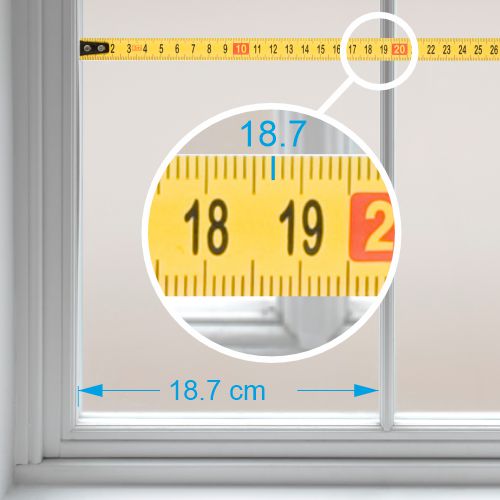
Width: measure from left to right at the top and the bottom of the glass, and take note of the largest measurements (some older wooden windows are not perfectly square).
Height: measure from top to bottom on the left and the right of the glass, and take note of the largest measurements.
Top tip
Leaving a clear gap around frosted or patterned film is a stylish and practical option, allowing you to peep out when someone is at the door for example. To create a clear outline around the film, deduct twice the width of the desired clear outline, to the width and the height of your pane.
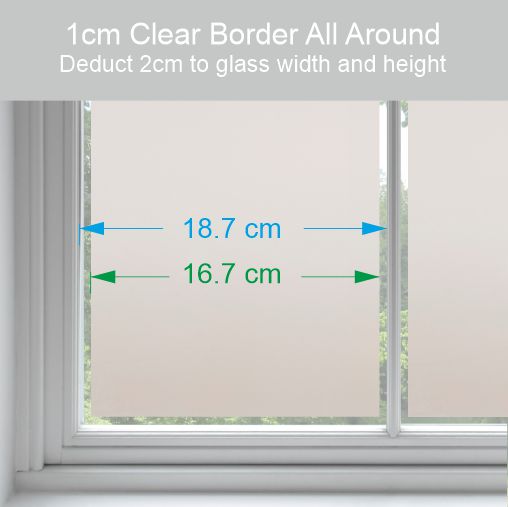
For example, if you want a 1cm (10mm) clear gap all the way round, deduct 2cm from the width, and the same from the height.
Fitting the film with a gap all the way round is much easier, especially on old wooden windows and doors which are not always in the best condition, and where the edge of the glass has paint encroachment.
Care
How To Care For Your window film After Installation
Window film is very easy to look after and you won't need any special products to clean it with. In fact, soapy water, similar to the solution you used to apply the film is the best cleaning product.
Do's
Wait for at least 3 weeks before first cleaning your film
Use soapy water
Use a soft cloth or paper towel
Use a rubber edged squeegee (unless the film is printed or has cut outs) in good condition
Don'ts
Do not use abrasive products
Do not use Amonia based products
Do not use defective or damaged squeegees
Caring for printed films, or films with cut-outs
Extra care must be taken when cleaning printed films, or films which have been cut out and have exposed edges. Gently clean with a soft cloth only, and take particular care around the cut areas. Do not rub too hard or use a squeegee as it could damage the print or your cut film.
Caring for static cling films & stickers
Take extra care around the edges and clean your sticker or film from the centre out. Do not use a squeegee.


